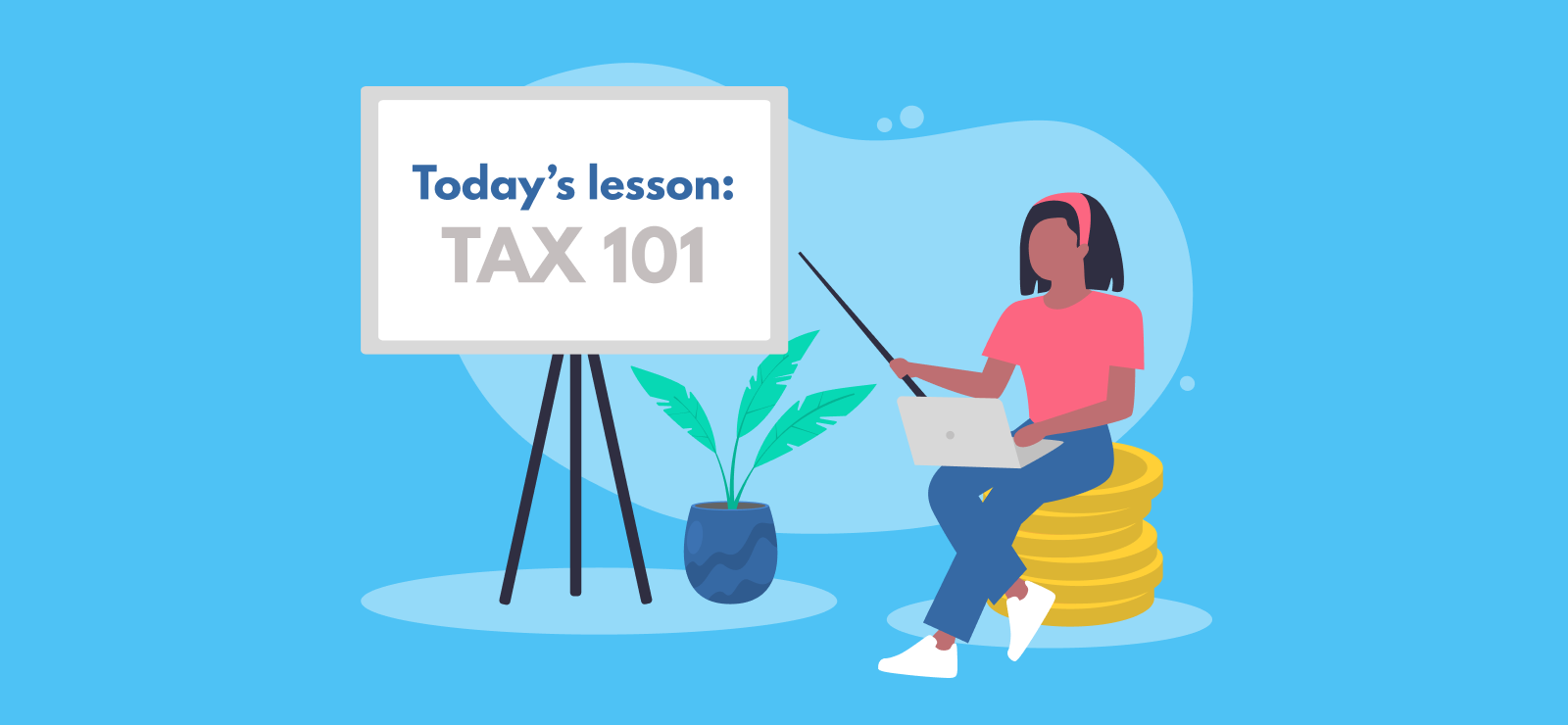

Schools Need to Teach Children About Tax, Say Britain’s Entrepreneurs
Ask any business owner what it’s like to be self-employed, and they’re likely to give you some version of it being both liberating and terrifying in equal measure. As an online accountancy firm, it’s something we hear nearly every day.
One of many challenges entrepreneurs have when managing their to-do list is working out what else they might need to tick off. How are you supposed to stay compliant with tax rules if you don’t even know what rules exist?
Schools should add tax to the curriculum
Schools should add tax to the curriculum and teach children better financial literacy skills, according to Britain’s entrepreneurs. In a survey of 1,188 business owners, almost two-thirds believe tax should be compulsory in the classroom.
The same survey also found 25% of business owners believe HMRC should communicate more clearly to young people, with just two per cent saying it’s a parent’s job to teach children about tax.
Whose job is it anyway? Financial education on the curriculum
Financial education is currently included in the curriculum for secondary schools in England. An update to the curriculum taught in primary and secondary schools in Wales included elements of financial education within lessons on maths, and health and wellbeing.
‘Financial capability’ is also included in the national curriculum for pupils aged three to 14, through maths and numeracy lessons.
Despite this, a survey of 401 primary and secondary school teachers carried out by the All-Party Parliamentary Group on Financial Education (APPG) for Young People found over two-fifths of secondary school teachers are unaware financial education is on the current curriculum. The inquiry earlier this year found ‘confusion’ existed amongst some teachers about whether schools were required to provide financial education.
A review into financial education for young people
The government announced the Curriculum and Assessment Review in July 2024. Chaired by Professor Becky Francis CBE, it will aim to define a ‘broader, richer, cutting-edge curriculum’.
Education Secretary Bridget Phillipson said:
“The launch of this review is an important step in this government’s mission to break down barriers to opportunity, deliver better life chances and enable more young people to get on.
“Our renewed curriculum, built on a foundation of high and rising standards, greater access to cultural learning and crucial work and life skills, will set up all our children to achieve and thrive in the workplace of the future, and throughout their lives.”
We must do more to prepare the next generation of business owners
Lee Murphy, Managing Director of leading online accounting firm The Accountancy Partnership, knows all too well the impact tax knowledge can have on a business.
“It would be hugely beneficial for tax to be taught at schools and give children and youngsters the ability to demystify what can be a very complex topic.
“If business owners are struggling with these essential concepts, it’s clear that we’re not doing enough to prepare the next generation.
“Schools would play a crucial role in equipping young people with the knowledge they need to navigate the financial landscape, and this will lead to a more resilient economy.”
“Taking action now will help future generations avoid money problems in the future.”
Finding support for Tax Education
Tax manuals are often confusing, and difficult to find and navigate, with entrepreneurs slamming HMRC for poor information about tax. Of those surveyed, only 28% found the government agency’s resources to help small businesses to be “somewhat effective”.
What do business owners know about reducing their tax bill?
Despite the inevitable nature of paying tax, there are lots of ways business owners can manage their tax liability. The problem seems to be knowing what tax allowances are available, with this information rarely made obvious unless you know what to look for in the first place. A huge 86% of business owners regularly rely on an accountant for information about tax.
When asked what they wished they had known about tax before starting a business, 36% said what to claim as an expense.
Understanding what counts as a business expense in order to claim it against tax is a mystery to many. An earlier survey of 1,247 small business owners revealed more than 8 in 10 (81%) weren’t entirely sure what qualifies as a business expense.
Knowing when tax deadlines are
Luckily, 69% of businesses owners said they’re aware of key tax filing deadlines for their business, but nearly a third didn’t know or weren’t sure. It’s cause for concern, with HMRC’s strict stance resulting in automatic penalties for late submissions, even if tax information is correct.
Confusion with side hustle tax
One of the problems seems to be in making the connection between what the rules are, and how they’re explained. The Accountancy Partnership’s survey of more than 1,000 entrepreneurs revealed some alarming statistics about the current state of tax knowledge among business owners.
Lee Murphy, Managing Director of The Accountancy Partnership, said:
“Last year, there was much confusion about the so-called ‘side hustle tax’ with many believing a new tax had been introduced for people who sell online. In reality, this was not the case.
“The new rules made it a requirement for online marketplaces to share information about their sellers with HMRC, but this announcement was framed in a way which caused anxiety for taxpayers.
“This gave us the idea to launch Tax Education, which will take our clients and those interested in learning back to school and teach them how to successfully manage their tax affairs.
“The survey results were incredibly revealing, and it is clear there is a worrying gap in financial education, particularly regarding tax.
Business owners aren’t confident they understand tax rules
Unfortunately, it seems that finding out where to start their research is only the first stage of tax compliance for business owners. Complicated jargon, seemingly contradictory requirements, and the sheer sprawling nature of tax advice makes the rules difficult to interpret correctly.
Only a third indicated any degree of confidence in their knowledge.
The majority of business owners (67%) prefer to work with an accountant to help them improve their understanding of tax information. Only 20% use government websites to find information.
Desire to know more about tax
Despite lacking confidence and struggling to find information, nearly 80% of business owners expressed a keen desire to learn more about their tax obligations. It seems locating and understanding information is still a barrier though, with 41% of those saying that it will take too much time.
What are the most common types of tax?
The most common types of tax which apply to our clients are Corporation Tax (80%), income tax (46%), NI contributions (45%), and VAT (37%). One of the obstacles of paying different types of tax for a single business is knowing what to do and when, with deadlines spanning the calendar also depending on what type of business structure is used.
Lee Murphy, Managing Director of The Accountancy Partnership:
“Limited companies in particular might have a number of deadlines to keep track of, from submitting accounts to Companies House and tax returns to HMRC, and beyond to Self Assessment for the company directors, and PAYE reporting for directors’ payroll.
“It means business owners are under enormous pressure to know what deadlines apply to them so they can take the appropriate action.”
Most popular way to track income and expenses
Accounting software is the most popular way to keep track of income and expenses (68%), with spreadsheets second (26%) and paper records third (7%). This is encouraging given the ongoing roll-out of Making Tax Digital, which requires businesses to keep financial records digitally and submit tax returns using special software, but there is still more to be done so taxpayers can feel confident using tax accounting software.
Key stats from the survey
At a glance
In a survey of 1,188 business owners carried out by The Accountancy Partnership:
- Almost two-thirds of entrepreneurs believe tax should be compulsory in the classroom
- 25% of business owners believe HMRC should communicate more clearly to young people
- Two per cent of businesses say it’s a parent’s job to teach children about tax
- Only 28% find HMRC’s resources to help small businesses to be “somewhat effective”
- 82% of business owners do not know what tax incentives or reliefs are available to them
- 36% wish they had known more about what to claim as an expense before starting their business
- 86% of business owners regularly rely on an accountant for information about tax
- Just three per cent of businesses say they are “very confident” in understanding self-employed tax
- Only a third of entrepreneurs have any degree of confidence in their tax knowledge
- Nearly 80% of business owners are keen to learn more about their tax obligations, but 41% of those say it will take too much time
In a survey of 401 primary and secondary school teachers carried out by the All-Party Parliamentary Group on Financial Education (APPG) for Young People
- Two-fifths of secondary school teachers are unaware financial education is on the current curriculum
Notes to Editors
The Department for Education (DfE), HMRC and the Press Secretary to the Secretary of State for Education all refused to provide statements in advance to Chris Bradley, the creator of the Tax Education campaign and author of this press release. The DfE and HMRC said they would provide statements to any media outlet who want to run the story.
For more information, please contact Chris Bradley at chris.bradley@theaccountancy.co.uk
Want to learn more?
Subscribe to our newsletter to get accounting tips like this right to your inbox

Read more posts...

Accounting for Cash Payments in UK Businesses
3rd March 2026Card machines, Apple Pay, and bank transfers may be the norm these days, but cash is far from dead. This blog breaks…
Read More
When Should I Submit My 2025/26 Self Assessment Tax Return?
2nd March 2026You don’t have to wait for the January deadline, and can submit your Self Assessment return as soon as the tax year…
Read More
Transferring Assets to A Limited Company
1st March 2026Incorporating your company is a big, exciting step, but there’s a bit of a hill to climb first before you can enjoy…
Read MoreConfirm Transactions
The number of monthly transactions you have entered based on your turnover seem high. A transaction is one bookkeeping entry such as a sale, purchase, payment or receipt. Are you sure this is correct?
Please contact our sales team if you’re unsure
VAT Returns
It is unlikely you will need this service, unless you are voluntarily registered for VAT.
Are you sure this is correct?
Call us on 020 3355 4047 if you’re not sure.
MTD IT Quarterly Updates
Your final, end of year MTD Income Tax submission is included in your fee, without this add-on service.
We would recommend you submit the quarterly updates yourself using Pandle or alternative bookkeeping software.
However, if you would prefer us to submit these quarterly updates for you, there is an additional fee of £35.00 per month.
Call us on 020 3355 4047 if you’re not sure.
Bookkeeping
You will receive our bookkeeping software Pandle for free, as part of your package.
You can use this to complete your own bookkeeping, or we can provide a quote to complete your bookkeeping for you.
Please select and option below:
Call us on 020 3355 4047 if you’re not sure.

